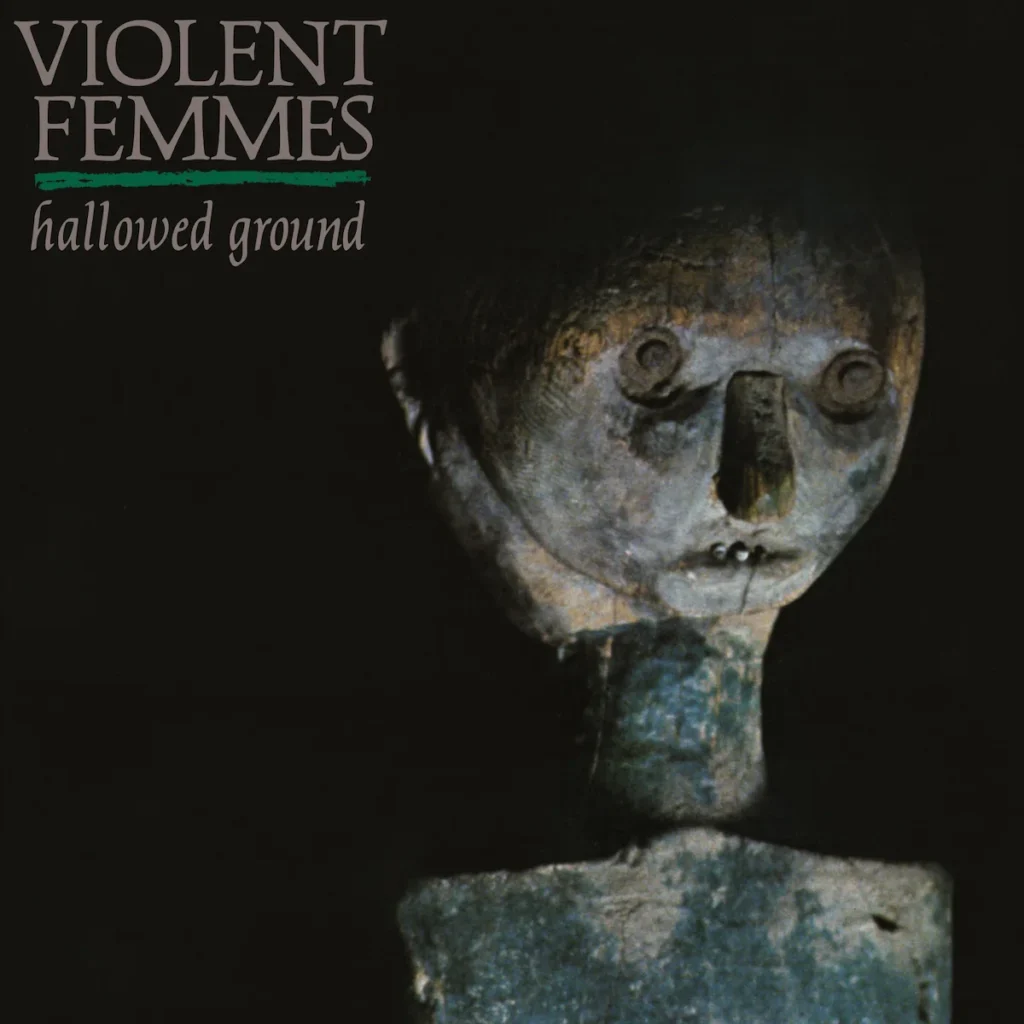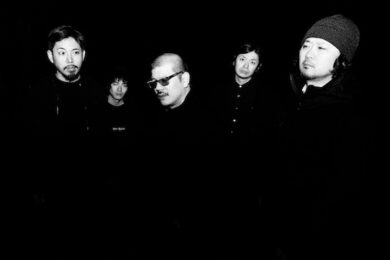Violent Femmes self-titled debut album remains a core text of the teenage angst curriculum. It is a perfect document of that very particular feeling of experiencing love, lust and loss for the first time, and it’s still one of the high watermarks of jittery American college rock. It was conceived on the streets of Milwaukee, Wisconsin. Gordon Gano (vocals, guitar), Brian Ritchie (bass), and Victor DeLorenzo (a single snare drum) did not hone their craft in the pubs and the clubs of their hometown, but instead busked their way to a record deal. You can hear this in the music – Gano’s voice is snotty and whiny, the diminutive teenager desperate to be heard above the wild city chaos.
At this time, the band were an authentically weird group of misfits, which only served to load the simple songs of the debut with charm and character; Gano is front and centre, with his geeky, affected poet persona, a crude Midwest Jonathan Richman, whilst Ritchie, like, twice his height, and DeLorenzo, like, twice his age, look like they’re part of different groups entirely.
The album’s lifeblood runs right through the veins of American indie rock, with artists from Pixies and Half Japanese to Pavement and Car Seat Headrest taking clear influence – for whole scenes, genres, it is the blueprint. But very few bands really sound much like Violent Femmes at all, do they?
Obviously, very few singers sound like Gordon Gano. 19 years of age at the time of recording the debut, he had already developed the bleating voice of a wizened old goat. But you also feel like very few of their contemporaries would be brave enough to deliberately limit themselves to just the human voice and bare-minimum acoustic instruments – especially in an age where indie groups were starting to shroud themselves in reverb, and pop was reaching true maximalist excess.
It’s this bravery that would dictate the band’s next move, an abrupt left turn from the surprise hit of their debut, as sharp as any in the history of indie rock.
Hallowed Ground was released 13 months and one day after the debut, and it arrived as the absolute antithesis to the fizzy pop rushes of its predecessor. Brooding and gloomy, it is a dark album that sees Gano channel the same adolescent angst as before into writhing tantrums and thunderstorms. They negate the sophomore slump by tapping into a morose vein of Americana: “It’s of utmost importance, we’re dealing with a volatile substance,” goes the chorus of ‘Never Tell’
A brief listen to both records might suggest that nationwide tours and a few months of very low-level fame had tipped the Femmes over the edge, but the truth is much simpler. Gano wrote the Hallowed Ground songs concurrently with their debut – so this is best viewed as a yin-yang, an expression of the duality of the young man. Joyous teenage hedonism, and fearful, deep Christian guilt.
The tentacular influence of Christianity is inescapable on Hallowed Ground. It was unmentioned on their debut – save for Gano “patiently pray, pray, praying” for sex on ‘Please Do Not Go’ – but on this album the Violent Femmes, are a fire-breathing Christian country outfit.
To contemporary audiences, this left turn was unexpected and off-putting. Some saw the Femmes’ pivot to Christian country as the ultimate ironic joke. And other charitable readings of the group’s new direction saw it as the ultimate punk rebellion, at a time of great saturation and fragmentation in punk rock – this camp includes Femmes bassist Ritchie, an atheist who initially wanted Gano’s songwriting to forego the almighty altogether, but eventually got a kick out of performing these unexpected spirituals to madding crowds.
Gano, however, New York-born son of a baptist minister, was as serious as your life about God, Jesus and everything else on this record. It’s this authentic, red-eyed fear of God that makes lines like, “I stood right up in the heart of hell, I never tell” and “kiss your mother good night, and remember that God saves”, hit like a freight train, when they could just as easily fly by as ironic verbal slurry.
Not every song on Hallowed Ground is deep Americana cut from the cloth of the more vengeful readings of Christian tomes, but it is certainly the numbers of this nature that have the greatest impact, and see the Violent Femmes really develop their sound into something else entirely.
‘Country Death Song’ is the opener, and possibly the best example of this, a scornful murder ballad, in which a deep evil resides. Gano’s narrator, a poverty-stricken father, is starving and unable to provide for his family, and musing on ways to end the infernal suffering of their lives. As the song reaches its climax, he decides he must kill his beloved daughters in cold blood for a chance of salvation. He pushes the youngest into a deep well, and upon realising the barbarism of his sin, hangs himself in his barn. It’s accompanied by a ramshackle rhythm section, as DiLorenzo and Ritchie provide a jugband stomp as the backdrop, and Gano conjures up a hellstorm on the banjo.
‘Country Death Song’ is followed by a wonderfully morbid, cinematic interlude, a skittish morbid patter song called ‘I Hear The Rain’, driven onwards briskly by a cartoonishly dingy group vocal chant. It works as an ample aperitif for the album’s centrepiece, ‘Never Tell’, and ensures that Hallowed Ground’s first side is, by a distance, the best side of music in the band’s discography.
‘Never Tell’ taps into the same evils bubbling away in the underbelly of America as ‘Country Death Song’, as Gano conjures a brazen narrative about cycles of abuse. A winding and ambitious opus, it traverses 7 minutes of free-form writhing blues. All crescendos and catharses, Gano’s vocals are harrowing and unhinged, and the scratching, scraping guitars are awe-striking – a maudlin aria of biblical magnitude.
Meanwhile, the title track begins with a reading from Hosea 9:7: “The prophet is a fool, the spiritual man is mad / For the multitude of thy iniquity / And the great hatred…” before the group lumber into a taut and agitated number about keeping faith during a nuclear apocalypse. It has a delightfully slinky piano piece, and Gano’s holler here is particularly petrified.
However, with very mixed results, there are songs of a very different nature on Hallowed Ground. After all, this is Gano’s first straight-faced Christian writing, and he looks to balance the unrelenting darkness of the album’s opening three track run with touches of divinity elsewhere.
‘It’s Gonna Rain’ is actually a delight; a retelling of Noah’s Arc in the style of Jonathan Richman, that revels in some kind of barn dance groove. It’s genuinely admirable that Gano makes the opening line sound so natural: “Now who (who?) do you think I am? I built this ark with Japheth, Shen and Ham.”
The way the album ends with a call and response of “40 days and 40 nights! / it’s gonna rain!” is also extremely fitting, and a charming conclusion. However, some of the content in between the monolithic rural-gothic opening run, and the palette-cleansing stomp of ‘It’s Gonna Rain’ leaves a lot to be desired.
‘Jesus Walking On Water’ doesn’t quite have the charm of ‘It’s Gonna Rain’, and is one of the rare tracks where even I, the most ardent defender of Gano’s whine, find his bleating a bit too annoying. ‘Sweet Misery Blues’, definitively an offcut from the debut, and ‘I Know It’s True But I’m Sorry To Say’ are nice enough ditties, but shrivel when held up to the blazing majesty of the album’s darker cuts. But the worst number here is ‘Black Girls’, which was surely not fine at the time, and is even worse now.
A charitable reading of ‘Black Girls’ would be that Gano adopts a racist, sexist persona to highlight the ridiculousness of these worldviews, but the snarl of: “I dig the Black girls/so much more than the white girls”, just churns the stomach. Even though this song sees a foetal John Zorn lay down some fantastic frenetic saxophone, the whole thing feels schlocky with Gano’s worst vocals and lyrics at the fore.
This flurry of filler means that Hallowed Ground is an imperfect album, a lesser record than the streamlined, fat free debut. The highs, however, are phenomenal. It is a remarkable and brave follow-up to a bona fide classic album, and while it is understandable that it slipped through the cracks, it really shouldn’t have. Its 40th anniversary reissue is the perfect time to take stock, and place it alongside the debut as an indie rock diptych, about the thrills, perils, highs and lows of adolescence in 80s America.
A vinyl reissue of Violent Femmes’ Hallowed Ground is released today (8 November)





